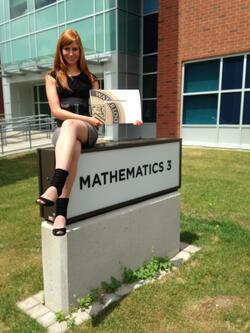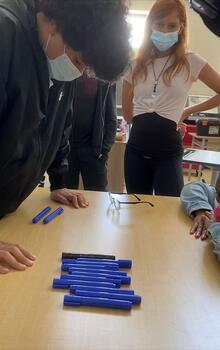When Mélissa Tardibuono (BMath ’14) started out as a student in the Faculty of Mathematics, she had some doubts.
She felt at times that she did not belong. When she looked around at her classmates in mathematics and computer science, she could not help but notice how fewer women there were. It was, as she recalls, somewhat isolating.
“When you’re young, you have all these doubts and insecurities,” Tardibuono said. “I later learned that’s part of imposter syndrome, and many women experience this feeling that they don’t belong or don’t deserve to succeed.”
It was also difficult, Tardibuono explained, because even if she knew it was extra challenging for women to break into STEM fields, she also felt that when she did succeed it was only because she was a girl.
“When I’d get co-op jobs,” she continued, “I wondered if it was only because they were trying to check the box for diversity. Don’t get me wrong, I had great experiences in my co-ops, but it’s just this nagging doubt that was there.”

As she progressed through her undergraduate degree, Tardibuono says she found sources of strength and inspiration in some of the people around her. Her mother, who is a retired high school math teacher and whose footsteps Tardibuono followed in, instilled in her the belief that not only was she worthy and deserving, she was exceptional. Tardibuono’s older brother was a student in the Faculty of Math and sparked the interest in coding.
She also had an unofficial peer mentor in the program, her friend and confidant, Marguerite.
“Marguerite helped me in some of my computer science classes,” Tardibuono said. “We actually went to the same high school, and she was three years older than me and friends with my brother. She showed me the ropes in math and computer science, and I looked up to her.”
As she found her feet in the faculty and grew in confidence, Tardibuono got involved in outreach efforts aimed at helping other women and girls get into STEM fields. She worked with CS Girls Rock, which was a program for secondary school girls to learn about computer science and coding.
Working with girls and helping them learn tech skills lit a fire in Tardibuono. She always had an interest in teaching, influenced by her mother, and it became her passion to reach girls and young people more generally at the time in their lives that could make a difference. After completing her undergraduate degree in mathematics, she went on to complete an education degree and embarked on her teaching career.

Now, as a teacher at École secondaire Ronald-Marion in Pickering, Tardibuono is not only teaching a full course load of math and computer science during regular school hours, she is also running a coding club for girls after school.
“We do coding and develop tech skills, of course,” she said. “But it’s also about leadership and personal growth. There are students who are ambassadors with Canada Learning Code and they are the ones who prepare the materials and run the workshops.”
“What I’ve learned is that it’s important to plant the love of computer science early, so the skills are there by the time the girls get to university. But I’ve also learned that it’s about self-confidence and self-actualization. It’s my life mission to get more diversity and inclusivity in STEM, and I feel like I’m on the right track with the coding program.”
Tardibuono is currently expanding her outreach efforts working with her team at Canada Learning Code as a chapter lead and developing the Teen Ambassador’s coding clubs. She is also launching a new website, which aims to connect with a broader audience of women and girls. Learn more on TheCodingBarbie.com website.




